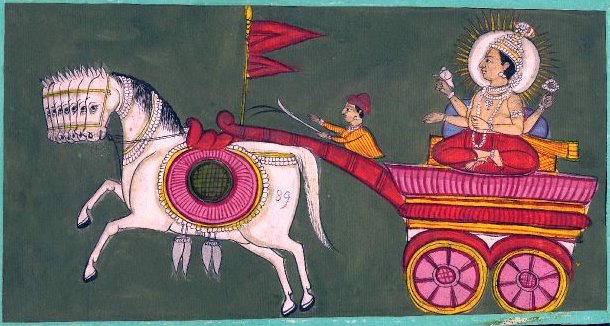In the rich tapestry of India’s spiritual heritage, the worship of Surya, the radiant sun deity, holds a sacred place. Revered since ancient times as the bestower of life, light, and energy, Surya is worshipped with fervent devotion across the length and breadth of the country. Rooted in Vedic traditions and intertwined with the fabric of Hindu culture, Surya worship illuminates the path of spiritual seekers, offering profound insights into the interconnectedness of the cosmos and the divine presence within.
Ancient Origins and Mythological Significance
The origins of Surya worship can be traced back to the ancient scriptures of the Vedas, where hymns dedicated to Surya extol his celestial splendor and cosmic significance. In Hindu mythology, Surya is depicted as the radiant god riding a chariot drawn by seven horses, symbolizing the seven days of the week and the seven colors of the rainbow.
According to legend, Surya is revered as the source of life-giving energy and the ultimate dispeller of darkness, whose benevolent rays nourish and sustain all living beings on earth. His journey across the heavens symbolizes the cyclical nature of time, the rhythm of creation, and the eternal cycle of birth, death, and rebirth.
Spiritual Symbolism and Philosophical Insights
The worship of Surya embodies profound spiritual symbolism and philosophical insights that resonate with seekers on their quest for self-realization and enlightenment. Surya is revered not merely as a celestial body but as a manifestation of the divine cosmic energy that permeates the universe.
In the practice of Surya Namaskar (Sun Salutation), a sequence of yogic postures dedicated to Surya, practitioners offer salutations to the sun, invoking its transformative energy to awaken the inner light and vitality within. Each posture in Surya Namaskar corresponds to a specific aspect of Surya’s divine attributes, symbolizing virtues such as strength, courage, vitality, and inner radiance.
Moreover, the symbolism of Surya as the dispeller of ignorance and the revealer of truth resonates deeply with seekers on the spiritual path, inspiring them to overcome the darkness of ignorance and awaken to the light of wisdom and self-awareness.
Cultural Traditions and Ritual Practices
Surya worship is deeply ingrained in the cultural traditions and ritual practices of India, manifesting in various forms of worship, festivals, and rituals dedicated to the sun god. The most prominent of these is the Chhath Puja, a four-day festival celebrated with great fervor in the states of Bihar, Jharkhand, and Uttar Pradesh, where devotees offer prayers and offerings to Surya, seeking his blessings for prosperity, well-being, and longevity.
Additionally, temples dedicated to Surya, such as the Konark Sun Temple in Odisha and the Modhera Sun Temple in Gujarat, stand as magnificent architectural marvels, embodying the timeless devotion and artistic expression inspired by the sun god.
Universal Reverence and Ecological Harmony
Beyond the boundaries of religion and culture, Surya worship transcends sectarian divides and holds universal relevance as a symbol of cosmic harmony and ecological balance. The reverence for the sun as the source of all life underscores the interconnectedness of all living beings and the sacredness of nature.
In an age marked by environmental challenges and ecological crises, the ethos of Surya worship reminds us of our inherent connection to the natural world and the imperative to honor and protect the environment for future generations.
The spiritual essence of Surya worship in India offers a profound journey of self-discovery and spiritual awakening, guiding seekers on the path of inner illumination and universal harmony. As we bask in the radiant glory of the sun, let us imbibe the timeless wisdom and divine grace of Surya, embracing the radiance that shines within and without.






